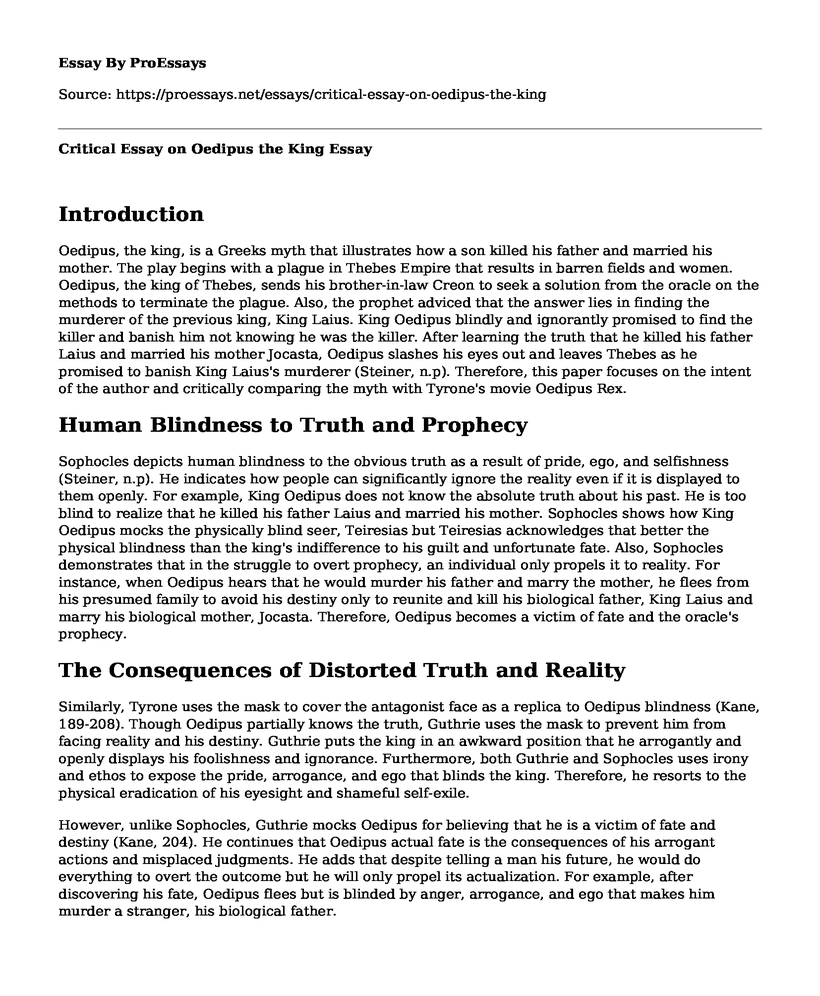Introduction
Oedipus, the king, is a Greeks myth that illustrates how a son killed his father and married his mother. The play begins with a plague in Thebes Empire that results in barren fields and women. Oedipus, the king of Thebes, sends his brother-in-law Creon to seek a solution from the oracle on the methods to terminate the plague. Also, the prophet adviced that the answer lies in finding the murderer of the previous king, King Laius. King Oedipus blindly and ignorantly promised to find the killer and banish him not knowing he was the killer. After learning the truth that he killed his father Laius and married his mother Jocasta, Oedipus slashes his eyes out and leaves Thebes as he promised to banish King Laius's murderer (Steiner, n.p). Therefore, this paper focuses on the intent of the author and critically comparing the myth with Tyrone's movie Oedipus Rex.
Human Blindness to Truth and Prophecy
Sophocles depicts human blindness to the obvious truth as a result of pride, ego, and selfishness (Steiner, n.p). He indicates how people can significantly ignore the reality even if it is displayed to them openly. For example, King Oedipus does not know the absolute truth about his past. He is too blind to realize that he killed his father Laius and married his mother. Sophocles shows how King Oedipus mocks the physically blind seer, Teiresias but Teiresias acknowledges that better the physical blindness than the king's indifference to his guilt and unfortunate fate. Also, Sophocles demonstrates that in the struggle to overt prophecy, an individual only propels it to reality. For instance, when Oedipus hears that he would murder his father and marry the mother, he flees from his presumed family to avoid his destiny only to reunite and kill his biological father, King Laius and marry his biological mother, Jocasta. Therefore, Oedipus becomes a victim of fate and the oracle's prophecy.
The Consequences of Distorted Truth and Reality
Similarly, Tyrone uses the mask to cover the antagonist face as a replica to Oedipus blindness (Kane, 189-208). Though Oedipus partially knows the truth, Guthrie uses the mask to prevent him from facing reality and his destiny. Guthrie puts the king in an awkward position that he arrogantly and openly displays his foolishness and ignorance. Furthermore, both Guthrie and Sophocles uses irony and ethos to expose the pride, arrogance, and ego that blinds the king. Therefore, he resorts to the physical eradication of his eyesight and shameful self-exile.
However, unlike Sophocles, Guthrie mocks Oedipus for believing that he is a victim of fate and destiny (Kane, 204). He continues that Oedipus actual fate is the consequences of his arrogant actions and misplaced judgments. He adds that despite telling a man his future, he would do everything to overt the outcome but he will only propel its actualization. For example, after discovering his fate, Oedipus flees but is blinded by anger, arrogance, and ego that makes him murder a stranger, his biological father.
Conclusion
In summary, both Sophocles and Guthrie exhibit how truth and reality can be distorted, misrepresented and evaded. The transitional blindness from the truth promoted anger in Oedipus after realizing the mother's betrayal whose crime resulted in suicide and made Oedipus a self-destructive being. Therefore, human fate is not only the consequences of his actions but sometimes it becomes as a result of unescapable prophecy. It is prudent to conduct one's self with dignity and accept the destined fate.
Works Cited
Kane, Robert L. "Prophecy and perception in the Oedipus Rex." Transactions of the American Philological Association (1974- ) 105 (1975): 189-208.
Steiner, John. "The retreat from truth to omnipotence in Sophocles' Oedipus at Colonus." International review of psycho-analysis (1990).
Frequently Asked Questions (FAQ) for Essay:
What is the main focus of the essay regarding Oedipus Rex?
This essay seeks to evaluate the intent of its author and critically compare Sophocles' interpretation of Oedipus Rex as depicted by Tyrone Guthrie's movie adaptation with Sophocles' original story as told by Tyrone Guthrie himself. Additionally, this discussion addresses human blindness towards truth, fate and prophecy's role and their effects upon reality distortions.
How does Sophocles depict human blindness in Oedipus Rex?
Sophocles' tragedy Oedipus Rex depicts human blindness through Oedipus, who remains unaware of the truth regarding his past despite its being revealed openly. Oedipus remains unaware that he killed his father and married his mother despite having every evidence in front of them; this blindness can be attributed to pride, egoism, or selfishness as possible explanations for this behavior.
How does Tyrone Guthrie use masks to represent blindness in his movie adaptation?
Tyrone Guthrie used masks in Oedipus Rex as a symbol of Oedipus' blindness and pride, arrogance and ego that prevented him from seeing reality and accepting his fate. These metaphorical barriers also served to obscure any truthful perceptions or acknowledgement from occurring for Oedipus.
Cite this page
Critical Essay on Oedipus the King. (2022, Jun 02). Retrieved from https://proessays.net/essays/critical-essay-on-oedipus-the-king
If you are the original author of this essay and no longer wish to have it published on the ProEssays website, please click below to request its removal:
- A Literary Essay on Functions of Metaphors and Similes in Gary Sotos Poetry
- The Portrayal of Human Love in the Poem Lady Mary Wroth's Pamphilia to Amphilanthus
- Compare and Contrast Essay on Society in novels 'The Brave New World' and 'The Great Gatsby'
- "Because I Could Not Stop for Death" by Emily Dickinson Essay
- Essay Sample on David Thoreau Citations
- Analyzing Joseph Conrad's Heart of Darkness Essay Example
- Paper Example on Parker's Back: Unveiling Dissatisfaction and Its Effects







